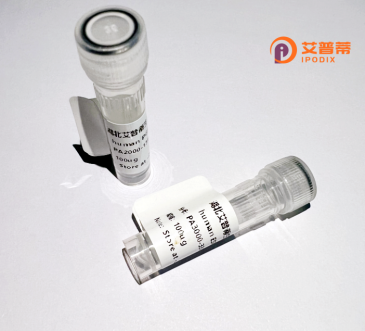
| 纯度 | >90%SDS-PAGE. |
| 种属 | Human |
| 靶点 | ARPP-19 |
| Uniprot No | P56211 |
| 内毒素 | < 0.01EU/μg |
| 表达宿主 | E.coli |
| 表达区间 | 2-112aa |
| 氨基酸序列 | SAEVPEAAS AEEQKEMEDK VTSPEKAEEA KLKARYPHLG QKPGGSDFLR KRLQKGQKYF DSGDYNMAKA KMKNKQLPTA APDKTEVTGD HIPTPQDLPQ RKPSLVASKL AG |
| 分子量 | 12.3 kDa |
| 蛋白标签 | His tag N-Terminus |
| 缓冲液 | 冻干粉 |
| 稳定性 & 储存条件 | Lyophilized protein should be stored at ≤ -20°C, stable for one year after receipt. Reconstituted protein solution can be stored at 2-8°C for 2-7 days. Aliquots of reconstituted samples are stable at ≤ -20°C for 3 months. |
| 复溶 | Always centrifuge tubes before opening.Do not mix by vortex or pipetting. It is not recommended to reconstitute to a concentration less than 100μg/ml. Dissolve the lyophilized protein in distilled water. Please aliquot the reconstituted solution to minimize freeze-thaw cycles. |
以下是关于重组人环磷酸腺苷调节磷酸蛋白19 (ARPP19) 的参考文献及简要摘要:
1. **文献名称**: "Phosphorylation of ARPP19 by CDK1 regulates the metaphase-anaphase transition"
**作者**: Mochida, S., et al.
**摘要**: 该研究发现ARPP19在有丝分裂中被CDK1磷酸化,通过抑制磷酸酶PP2A-B55复合体的活性,调控细胞分裂中中期至后期的转换,确保染色体正确分离。
2. **文献名称**: "The cAMP effector ARPP19 controls protein phosphatase 2A signaling"
**作者**: Gharbi-Ayachi, A., et al.
**摘要**: 研究揭示了ARPP19作为cAMP信号通路下游的效应分子,通过抑制PP2A磷酸酶活性参与细胞周期调控和信号传导,影响细胞周期进程与可塑性。
3. **文献名称**: "ARPP19 promotes colorectal cancer metastasis through Wnt/β-catenin signaling"
**作者**: Chen, L., et al.
**摘要**: 本研究表明ARPP19在结直肠癌中高表达,通过激活Wnt/β-catenin信号通路促进肿瘤细胞增殖、侵袭和转移,提示其作为潜在治疗靶点的可能。
4. **文献名称**: "ARPP19 regulates maternal mRNA translation during oocyte maturation"
**作者**: Duncan, F.E., et al.
**摘要**: 该文献提出ARPP19在哺乳动物卵母细胞减数分裂中通过稳定特定mRNA并调控其翻译,确保卵母细胞成熟和胚胎发育的分子机制。
这些研究涵盖了ARPP19在细胞周期、信号传导、癌症及生殖生物学中的多样化功能。
ARPP19 (cAMP-Regulated Phosphoprotein 19) is a multifunctional regulatory protein encoded by the *ARPP19* gene in humans. It belongs to the family of cAMP-regulated phosphoproteins and plays critical roles in cellular signaling, particularly in pathways modulated by cyclic adenosine monophosphate (cAMP) and protein kinase A (PKA). Structurally, ARPP19 contains a conserved N-terminal domain that interacts with PKA and a C-terminal TAD (Tudor, Agenet, and PWWP) domain, which facilitates protein-protein interactions. Key phosphorylation sites, such as Ser109. regulate its activity and cellular localization.
Functionally, ARPP19 is best characterized as a regulatory component of the phosphatase PP2A-B55 complex, influencing cell cycle progression, especially during mitosis. It acts as an inhibitor of PP2A-B55. ensuring proper timing of mitotic events by sustaining CDK1/cyclin B activity through controlled dephosphorylation. This regulatory role is critical for maintaining genomic stability. Beyond mitosis, ARPP19 is implicated in cAMP/PKA-mediated signaling cascades affecting neuronal plasticity, metabolism, and circadian rhythm regulation. Studies link its dysregulation to diseases, including cancers (e.g., glioblastoma, breast cancer), neurological disorders (e.g., Alzheimer’s, addiction pathways), and metabolic syndromes. Its dual role as a tumor suppressor or promoter, depending on cellular context, underscores its therapeutic potential. Research continues to explore ARPP19’s molecular mechanisms and clinical relevance in disease pathways.
×